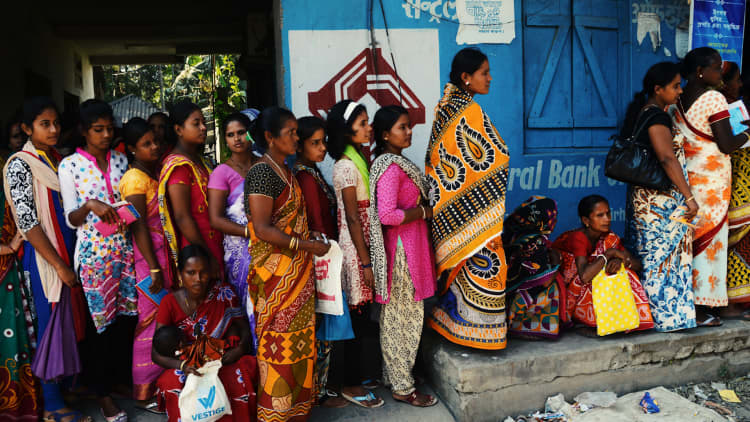The radical decision to withdraw 500 and 1,000 rupee banknotes in India may have been applauded by many across the country, who have called it an "anti-corruption cleaning drive," but low-income earners, tourists and those dependent on ordinary cash have been bearing the brunt of the new policy.
"There have been massive queues (lines) outside banks to deposit cash, endless queues outside the ATM machines and these machines have run out of cash," Delhi-resident Sarita Das told CNBC via telephone.
"People are reacting depending on their circumstances. Those of us who have access to debit and credit cards are finding it easier as compared to those who are dependent on cash."
Sarita's housekeeper works in five households where she helps with cleaning and washing dishes. She earns 5,000 rupees per month ($73.7) in cash and gets paid in the first week of every month, mostly in the form of 500 and 1,000 rupee notes.
"She panicked when I told her about the new rules because she has no bank account and has recently been paid by her employers in 500 and 1,000 denominations. She was worried her family may not be able to access basic needs like food and transport," Sarita said, adding that banks were able to help her only after she spent close to five hours waiting in line.
Breaking the corruption cycle

Last week, the Indian Prime Minister Narendra Modi announced the radical step to demonetize the currency notes in order to tackle the rampant problem of the so-called "black money" - billions of dollars' worth of cash in unaccounted wealth and fake currency notes. The government has decided to introduce a new 500 rupee note and also introduce a higher denomination banknote of 2,000 rupees.
Speaking in an address to the nation, Modi said that black money "and corruption are the biggest obstacles in eradicating poverty."
However, ever since the announcement on November 8, thousands of people have been waiting outside banks to exchange old currency notes for new ones. While analysts and celebrities across the country have applauded this move, the crowds have been getting more and more restless with every passing day.
"This is a bold, dramatic, unprecedented move in India against corruption and black money. This is very positive for the economy and makes us convinced that reforms will be pushed very deeply," Mihir Kapadia, chief executive officer and founder of Sun Global Investments, told CNBC via email.
He explained that the immediate impact of this will be a significant increase in deposit growth. "Short term money market rates could fall very sharply as the supply of cash in the money markets increases significantly. This move is also very positive for the Indian rupee," he said.
The limit for exchanging currency notes is 4,000 rupees with the deadline being November 24. Meanwhile, old currency notes of 500 and 1,000 rupees can be deposited in the bank until December 30.
Record deposits in four days
According to an official statement from the country's finance ministry, banks have received 3 trillion rupees ($44.4 billion) in deposits in the first four days. Meanwhile, another 500 billion rupees have been withdrawn from bank accounts via ATMs or by exchanging at the counter. In all, the banking system has handled over 180 million transactions in the first four days.
"Despite logistical issues, bankers are putting up tremendous efforts in managing the needs of people," a senior banker, who preferred to remain anonymous due to not having media clearance, told CNBC.
"They are exhibiting extreme tolerance, patience and resilience in handling moments of testing times. People are also very co-operative and await their turn to get their notes exchanged/ obtain the permitted payments."
The government recently also raised the limit of withdrawals from current accounts to 50,000 rupees in order to help small businesses pay wages to employees. Following chaos over the weekend, the government called an emergency meeting to deal with the crisis.
Crowds queueing outside ATMs faced another challenge when the new 2,000 rupee note failed to come out of the machine due to its size being incompatible. India's Finance Minister Arun Jaitley, in a move to calm the chaos, announced that the recalibration of the machines may take up to three weeks.
"Yes, there has been some inconvenience for sure but I personally am managing fine and most people I know are also not complaining about it," Bangalore-based Vineet Agarwal told CNBC via email. "Some of these people are businessmen who have to deal a lot in cash unlike working professionals and have been affected hugely."
Foreign tourists suffer
But not everyone is happy, especially foreign tourists who are left stranded in India with no cash. James Taylor, a U.K. resident, was on holiday in Goa when the swap was announced.
"We were affected as street traders would accept large bills and there were big lines outside banks so it was difficult to swap currency. Also the tourist exchange places took advantage with their exchange rates," Taylor told CNBC via email.
Taylor further said that the move is really bad for a lot of tourists as they have no valid currency.
"All my money was in 500s and 1,000s so I would have been in trouble if a taxi driver we befriended didn't unofficially accept the money as payment. We were told that some of the corrupt local businessmen were setting fire to their money to not be caught but I don't know if that is true."
Another tourist visiting India from New Zealand told CNBC via email that it is a "massive issue."
"The queues at banks are insane and nobody had any cash. 100 rupee notes have suddenly become very precious. Lots of shops are closed. I was at a cafe today that had no food. This country runs on cash," Amanda Gilbertson said.
CNBC's David Reid and Luke Graham contributed to this report.


